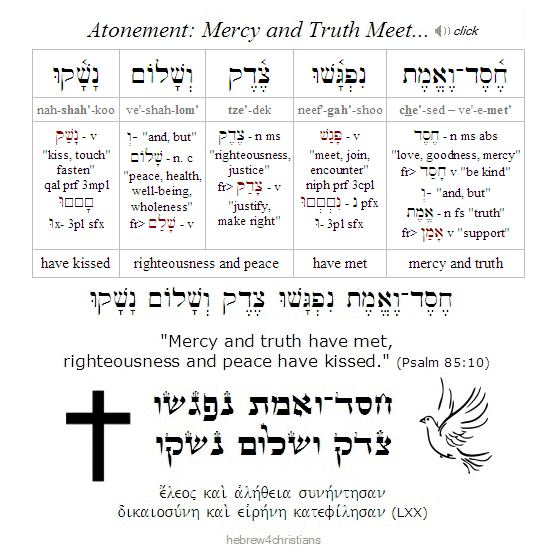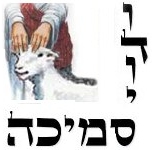|
FROM OUR TORAH PORTION this week (i.e., Vayikra) we read: "He shall bring it (i.e., the offering) to the entrance of the tent of meeting (אהֶל מוֹעֵד), that he may be accepted before the LORD. He shall lay his hand on its head and it shall be accepted for him to make atonement on his behalf (לְכַפֵּר עָלָיו). Then he shall slaughter it before the LORD, and Aaron's sons the priests shall bring the blood and throw the blood against the sides of the brazen altar. Then he shall flay the offering and cut it into pieces..." (Lev. 1:3-6).
We are justified by faith, but that means we bring our hope to the appointed place where God meets with us. We have "access by faith into this grace wherein we stand" (Rom. 5:2), and that implies we trust that God gives us right standing on account of his great love. We therefore come to the cross - the entrance of the tent - and "lean into" our Lord, identifying with his death as atonement on our behalf. As it is written: "God has ordained a place of atonement (i.e., ἱλαστήριος, or "mercy seat" [i.e., kapporet: כַּפּרֶת]), in the cross of Yeshua, accessible through faith in his blood, for the demonstration of His righteousness, so that God might be both just and the justifier of the one who has faith" (Rom. 3:25-26).
It has been noted that there were no prescriptions of words to be spoken during the semikhah/shechitah ceremony (i.e., sacrificial ceremony), no formulas or ritualized prayers. The sacrifice was performed in silence. The worshipper would firmly lay both hands on the head of the sacrificial victim and reflect that this animal's fate should really be his -- i.e., that he deserved to die for his sin. Only because of the LORD's mercy was this animal accepted in his place, and therefore the sacrificial rite was ultimately one of healing and restoration... This is the "korban" principle of "life-for-life." When the LORD saw the shed blood and ascending smoke of the sacrifice, He forgave the sinner based on his faith and teshuvah (repentance). The "sweet savor" (i.e., re'ach nicho'ach: רֵיחַ־נִיחוֹחַ) of the sacrifice refers to the future life (and healing) of the worshipper -- not the sacrifice itself. By itself -- apart from genuine repentance -- the sacrifice holds no power to forgive sin, and indeed, forgiveness is a relational concept (Matt. 5:24, 6:12, Isa. 1:11, etc.). In the Levitical system, the offering of a sacrifice served as a "symbol and expression of man's desire to purify himself and become reconciled to God" (Nehama Leibowitz: New Studies in Vayikra).
"God put forward Yeshua as a propitiation (ἱλαστήριον) through faith in His blood" (Rom. 3:25). The sprinkling of Yeshua's blood - represented by His Passion upon the cross - was "presented" upon the Heavenly Kapporet, before the very Throne of God Himself. Yeshua here functions as the great High Priest after the order of Malki-Tzedek (i.e., Melchizedek) who provides everlasting forgiveness for our sins (Heb. 9:7-10:10). Because of His sacrifice, the parochet - the wall-like covering separating the Holy of Holies - was rent asunder and God's love was let loose upon the world! Baruch Hashem! All those who are trusting in Yeshua as their atoning sacrifice before God (i.e., kapparah: כַּפָּרָה) are able to draw near to God full of confidence in his love (Heb. 4:16; Rom. 5:2; Eph. 3:12).
Hebrew Lesson
Psalm 85:10 reading:
 |
|



